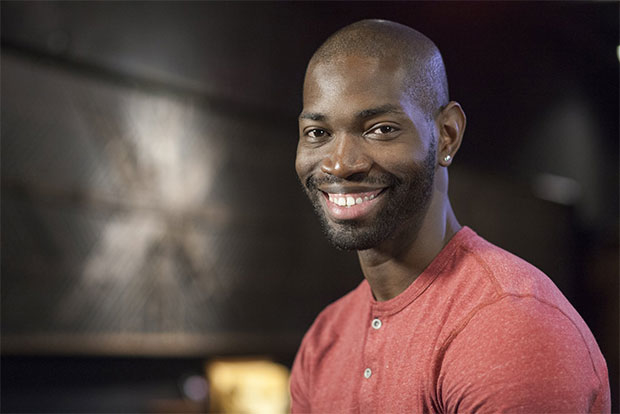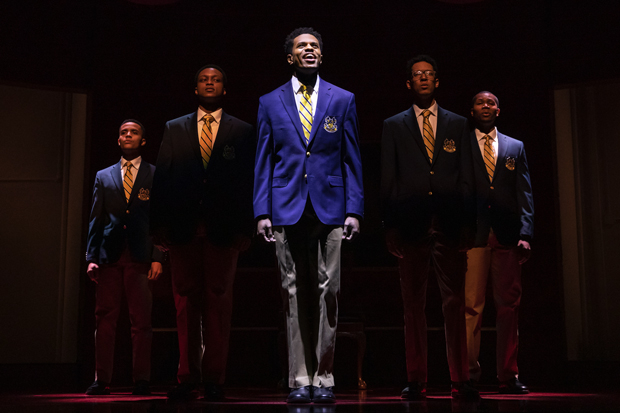Moonlight Writer Tarell Alvin McCraney on the Living Nature of Plays and Identity in Choir Boy
McCraney’s work shows how racism, homophobia, and other blinkered world views stop people from being people.

(photo provided by Boneau/Bryan-Brown)
Tarell Alvin McCraney will make his Broadway writing debut with Choir Boy on January 8, nearly six years after Manhattan Theatre Club premiered the play on its off-Broadway stage. Since then, the production has toured several regional theaters, companies across the country have produced the work independently, and McCraney went on to win a 2016 Oscar for Best Adapted Screenplay (from another play of his) for Moonlight.
Despite the time that's elapsed between the show's original staging and today, McCraney remains an engaged collaborator — and rewriter — on the piece as it makes its transition to Broadway.
"Like most of the work I do, if I can continue to do work on it and strengthen things, I do," said McCraney. "As one of the architects of the story my job is to continuously work with all the other collaborators to make sure that we are trying to tell the same story. For both Trip and I this play has always been about a young boy, a young gay boy, a young black gay boy, trying to find his voice within his community. That hasn't changed since the start of the piece, since the start of our working together."
In Choir Boy, the specific community in question is the high school choir at an elite African-American prep school, and the work is dotted with diegetic performances of spirituals that do more than advance the plot. Like the work itself, the play's musical performances work to illuminate multiple layers of McCraney's story about race, identity, and acceptance.

(© Matthew Murphy)
What do you see as your role during the rehearsal period, and how do you know when one of your plays is really finished?
As long as I'm alive, the play will always change. We have a lock date in theater so you can't change it after a certain amount of time for a production, but if we do another production I'm almost certain that there will be changes — whether they're great or small I don't know. But plays are living things. You have to allow them to shift and change for the new audience that comes in every night.
What do you see as the core of Choir Boy?
I think finding your place in society is at once a political, spiritual, and personal journey, and so it's watching someone negotiate that. It is at once about your physical corpus body, it's about how that body is allowed to be in the space, it's about your personality, your spirit, your abilities, it's about your most intimate self, your most private self. All of those things are braided at once when you're trying to figure out how you fit in society. It's about a negotiation of what's more important to you. Is it more important to be your most authentic self, or is it more important to uplift your community? And why does it have to be a choice?
What role does music play in Choir Boy?
Spirituals are a part of the black legacy in the Americas. The ways in which black folk found ways to marry original tradition to that music as means of preservation is a lasting legacy. There's 500 years of struggle and resistance and spiritual upliftment and nourishment embedded in those songs that have been passed down generation to generation.
It does exactly what we were talking about: It is spiritual, it is political, and it is personal all at the same time. A song like "Motherless Child" is about finding your way through life without a mother through God's grace but also about the horrors of slavery when most of those children were ripped away from their parents and didn't know who their parents were — and are ripped away from the continent, don't know where they come from. At the same time, it's about a person who struggles, who is trying to figure out how to go on while feeling depressed and traumatized. All of that has been handed down through generations of hardship and oppression in this country. In that beautiful piece of work — there is this diamond that we've been given, and it's sacred to us. So whereas some people may come in and feel like, "I don't get it, they're just songs." To us and to other traditions who have this kind of legacy within their culture, they will understand. It is highly important to figure out ways to hand down our traditions and pass the torch on and create leaders that are able to honor those traditions without sacrificing who they are as individuals.
Oftentimes the bodies that hold this very sacred covenant between the ancestors and ourselves are feminine male identified bodies, queer bodies. And there's a sort of unspoken question about the ability of these Levites to hold this ark. And why are they acceptable to hold this covenant or this spiritual tradition but not accepted in the community?
Could you expand on that parallel?
The Levites were the only people who were allowed to touch the ark of God. All of those rules that are in Leviticus are specifically for the Levites: They're not allowed to marry…there's a whole lot of rules and restrictions around them that come up, and specifically Leviticus is where we find the rules used to defend folks who are homophobic.
The parallel most mighty is in the fact that in the black church more often than not we talk about our choir directors and our choir boys and we will see bodies that are queer identifying or gender neutral or we can't quite ascribe a gender to them, and they're allowed to sing beautifully and take the spirituals and the gospels and make music as long as they don't have intimacies, don't be a full human being, only dedicate themselves to holding the tradition.
I'm using this parallel for this specifically, but we can describe a lot of the black experience in this country in the same way: As long as you play football, as long as you play basketball, as long as you do this amazing thing we will have some room for you, but do not wander too far off that path. Do not have your own thoughts. Do not have your own individuality. And I think that's a pretty important parallel.

(© Matthew Murphy)








